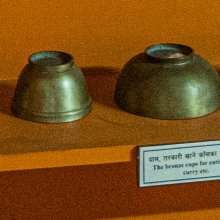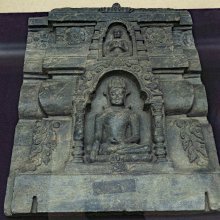Tal, Ṭal, Ṭāl, Tāl: 15 definitions
Introduction:
Tal means something in Hinduism, Sanskrit, Hindi, biology, Tamil. If you want to know the exact meaning, history, etymology or English translation of this term then check out the descriptions on this page. Add your comment or reference to a book if you want to contribute to this summary article.
Images (photo gallery)
In Hinduism
Vyakarana (Sanskrit grammar)
Source: Wikisource: A dictionary of Sanskrit grammarTal (तल्).—Tad, affix त (ta) (l) added in the sense of collection (समूह (samūha)) to the words ग्राम, जन, बन्धु (grāma, jana, bandhu) and सहाय (sahāya) and गज (gaja) also, e.g. ग्रामता, जनता (grāmatā, janatā) etc.; (2) added in the sense of 'the nature of a thing' (भाव (bhāva)) along with the affix त्व (tva) optionally, as also optionally along with the affixes इमन्, ष्यञ् (iman, ṣyañ) etc. given in P. V. 1.122 to 136; e. g. अश्वत्वम्, अश्वता (aśvatvam, aśvatā); अपतित्वम्, अपतिता (apatitvam, apatitā); पृथुत्वम्, पृथुता, प्रथिमा (pṛthutvam, pṛthutā, prathimā); शुक्लता, शुक्लत्वम्, शौक्ल्यम्, शुक्लिमा (śuklatā, śuklatvam, śauklyam, śuklimā); etc., cf Kas. on P.V.1.119 to 136. Words ending with the affix तल् (tal) are always declined in the feminine gender with the fem. affix आ (ā) (टाप् (ṭāp)) added to then; cf. तलन्तः (talantaḥ) (शब्दः स्त्रियाम् (śabdaḥ striyām)), Linganusasana 17.

Vyakarana (व्याकरण, vyākaraṇa) refers to Sanskrit grammar and represents one of the six additional sciences (vedanga) to be studied along with the Vedas. Vyakarana concerns itself with the rules of Sanskrit grammar and linguistic analysis in order to establish the correct context of words and sentences.
Biology (plants and animals)
Source: Wisdom Library: Local Names of Plants and DrugsTal [ꯇꯥꯜ] in the Manipuri language is the name of a plant identified with Duabanga grandiflora (Roxb. ex DC.) Walp. from the Lythraceae (Crape Myrtle) family having the following synonyms: Duabanga sonneratioides. For the possible medicinal usage of tal, you can check this page for potential sources and references, although be aware that any some or none of the side-effects may not be mentioned here, wether they be harmful or beneficial to health.
Tal [ताल] in the Hindi language is the name of a plant identified with Borassus flabellifer from the Arecaceae (Palm) family.
Tal [ताल] in the Nepali language, ibid. previous identification.
Tal [താള്] in the Malayalam language is the name of a plant identified with Colocasia esculenta (L.) Schott from the Araceae (Arum) family having the following synonyms: Alocasia illustris, Alocasia dussii.
Source: Google Books: CRC World Dictionary (Regional names)1) Tal in India is the name of a plant defined with Borassus flabellifer in various botanical sources. This page contains potential references in Ayurveda, modern medicine, and other folk traditions or local practices It has the synonym Lontarus domestica Gaertn., nom. superfl. (among others).
2) Tal is also identified with Sesamum indicum It has the synonym Capraria integerrima Miq. (etc.).
Example references for further research on medicinal uses or toxicity (see latin names for full list):
· Bulletin of the Botanical Survey of India (1972)
· Proceedings of the Indian Science Congress Association (1983)
· Proceedings of the Indian Science Congress Association (1981)
· sur les plantes rares cultivées dans le jardin botanique de Genève (1823)
· Taxon (1979)
· Species Plantarum (1753)
If you are looking for specific details regarding Tal, for example side effects, diet and recipes, chemical composition, extract dosage, health benefits, pregnancy safety, have a look at these references.

This sections includes definitions from the five kingdoms of living things: Animals, Plants, Fungi, Protists and Monera. It will include both the official binomial nomenclature (scientific names usually in Latin) as well as regional spellings and variants.
Languages of India and abroad
Sanskrit dictionary
Source: DDSA: The practical Sanskrit-English dictionaryṬal (टल्).—1 P. (ṭalati) To be confused or disturbed.
--- OR ---
Tal (तल्).—1 P., 1 U. (talati, tālayati-te)
1) To be full or complete.
2) To fix, found, establish.
3) To be fixed.
4) To accomplish a vow.
Source: Cologne Digital Sanskrit Dictionaries: Shabda-Sagara Sanskrit-English DictionaryṬal (टल्).—[ṭala] r. 1st cl. (ṭalati) To be confused, to be disturbed by fear, anxiety, &c. bhvā0 para0 aka0 seṭ-jvalā0 . viplave .
--- OR ---
Tal (तल्).—[tala] r. 1st and 10th cls. (talati tālayati-te) 1. To be full or complete to. 2. To fix, to found. 3. To establish. E. curā0 ubha0 pakṣe bhvā-para-saka-seṭ .
Source: Cologne Digital Sanskrit Dictionaries: Benfey Sanskrit-English DictionaryṬal (टल्).—i. 1, [Parasmaipada.] To be confused, v. r.
--- OR ---
Tal (तल्).—i. 1 and 10. To fulfil a vow.
Source: Cologne Digital Sanskrit Dictionaries: Cappeller Sanskrit-English DictionaryṬal (टल्).—ṭalati be confused or disturbed.
Source: Cologne Digital Sanskrit Dictionaries: Monier-Williams Sanskrit-English Dictionary1) Ṭal (टल्):—(= √ṭval, dval) [class] 1. [Parasmaipada] lati ([perfect tense] ṭaṭāla, [Pāṇini 7-4, 54 [Scholiast or Commentator]]) to be disturbed, [Dhātupāṭha xx, 4];
— [Causal] ṭālayati, to disturb, frustrate, [Campaka-śreṣṭhi-kathānaka]
2) Tal (तल्):—[class] 1. 10. talati, tālayati ([from] tarati, tāray, √tṝ) to accomplish (a vow), [cf. Lexicographers, esp. such as amarasiṃha, halāyudha, hemacandra, etc.];
2) —to establish, fix (derived [from] 1. talita), [Dhātupāṭha xxxii, 58.]
Source: Cologne Digital Sanskrit Dictionaries: Yates Sanskrit-English Dictionary1) Ṭal (टल्):—ṭalati 1. a. To be confused.
2) Tal (तल्):—(ki) talati tālayati 1. 10. a. To be full or complete; to fix.
Source: DDSA: Paia-sadda-mahannavo; a comprehensive Prakrit Hindi dictionary (S)Tal (तल्) in the Sanskrit language is related to the Prakrit word: Tala.
[Sanskrit to German]
Sanskrit, also spelled संस्कृतम् (saṃskṛtam), is an ancient language of India commonly seen as the grandmother of the Indo-European language family (even English!). Closely allied with Prakrit and Pali, Sanskrit is more exhaustive in both grammar and terms and has the most extensive collection of literature in the world, greatly surpassing its sister-languages Greek and Latin.
Hindi dictionary
Source: DDSA: A practical Hindi-English dictionaryTal in Hindi refers in English to:—(nm) the bottom; under part; surface, floor; ~[sparshi] going deep, profound..—tal (तल) is alternatively transliterated as Tala.
...
Kannada-English dictionary
Source: Alar: Kannada-English corpusTaḷ (ತಳ್):—
1) [verb] to be associated, mixed (with); to join or be intertwined.
2) [verb] to clasp in one’s arms; to embrace.
3) [verb] to align properly with; to be in correspondence with.
4) [verb] (a large group) to assemble in a relatively narrower place.
5) [verb] to fasten (oneself) as by gluing; to stick (to).
6) [verb] to set firmly (into the ground); to fix; to plant.
--- OR ---
Taḷ (ತಳ್):—
1) [verb] to set oneself against another; to oppose; to fight.
2) [verb] to obstruct, impede another’s movement, progress.
--- OR ---
Taḷ (ತಳ್):—
1) [verb] to clothe, adorn or put on.
2) [verb] to become spread throughout all parts; to pervade.
3) [verb] to come out from within.
4) [verb] to occur; to happen; to befall; to take place.
5) [verb] to appear; to be seen.
6) [verb] to put forth young leaves.
--- OR ---
Taḷ (ತಳ್):—[noun] anything that retards movement or progress; an impediment; an obstacle; a hindrance.
--- OR ---
Taḻ (ತೞ್):—
1) [verb] to be associated, mixed (with); to join or be intertwined.
2) [verb] to clasp in one’s arms; to embrace.
3) [verb] to align properly with; to be in correspondence with.
4) [verb] (a large group) to assemble in a relatively narrower place.
5) [verb] to fasten (oneself) as by gluing; to stick (to).
6) [verb] to set firmly (into the ground); to fix; to plant.
--- OR ---
Tāḷ (ತಾಳ್):—[verb] = ತಾಳು [talu]1.
--- OR ---
Tāḷ (ತಾಳ್):—[noun] = ತಾಳು [talu]2.
--- OR ---
Tāḷ (ತಾಳ್):—[noun] = ತಾಳು [talu]3.
--- OR ---
Tāḷ (ತಾಳ್):—[noun] the passage through the neck to the stomach and lungs; the throat.
--- OR ---
Tāḻ (ತಾೞ್):—
1) [noun] the slender stalk by which a fruit or leaf is attached to the plant; a stalk.
2) [noun] the lower part of tree (i.e. just above the ground).
3) [noun] the outer covering of grains, that can be separated by pounding, thrashing, etc.
4) [noun] the bottom portion of a chariot.
5) [noun] a going down below the surface of a liquid.
--- OR ---
Tāḻ (ತಾೞ್):—
1) [noun] the fan palm tree, Borassus flabellifer (= B. blabelliformis) of Arecaceae family, grown for its durable wood, its edible fruits and its leaves (used for thatching, etc.); palmyra.
2) [noun] toddy drawn from this tree.
3) [noun] a moveable bar or rod attached to a door, which fastens it to its frame when closed.
--- OR ---
Tāḻ (ತಾೞ್):—[noun] = ತಾೞ್ [tal]2.
Kannada is a Dravidian language (as opposed to the Indo-European language family) mainly spoken in the southwestern region of India.
Tamil dictionary
Source: DDSA: University of Madras: Tamil LexiconṬāl (டால்) noun [Telugu: ḍālu, K. ḍāl.]
1. Flag, colours; கொடி. [kodi.] (W.)
2. Shield; கேடகம். [kedagam.] (W.)
3. Lustre; ஒளி. [oli.]
4. Ostentatious, boastful speech; பெருமிதப்பேச்சு. அவன் டாலடிக்கிறான். [perumithappechu. avan daladikkiran.] Local usage
--- OR ---
Taḷ (தள்) [taḷtal [taṭṭal]] 9 transitive verb
1. [K. taḷ.] To hinder, obstruct, stop; தடுத்தல். புள் ளிடை தட்ப [thaduthal. pul lidai thadpa] (புறநானூறு [purananuru] 124).
2. To confine, as water in a tank; to dam up; நீர்முதலியவற்றைத் தளைத்தல். தட்டோரம்ம விவட் டட்டோரே தள்ளா தோரி வட்டள்ளா தோரே [nirmuthaliyavarraith thalaithal. thattoramma vivad dattore thalla thori vattalla thore] (புறநானூறு [purananuru] 18).
--- OR ---
Taḷ (தள்) noun < தள்ளு-. [thallu-.] [K. taḷḷu, M. taḷḷuka.] See தள்ளு [thallu], 1. ஒருதள் தள்ளினான். [oruthal thallinan.] Tinnevelly usage
--- OR ---
Tāl (தால்) noun < tālu.
1. Tongue; நா. பச் சைத் தாலரவாட்டீ [na. pas saith thalaravatti] (திருவாசகம் [thiruvasagam] 38, 4).
2. See தாலாட்டு. (யாழ்ப்பாணத்து மானிப்பாயகராதி) [thalattu. (yazhppanathu manippayagarathi)]
3. See தாலப்பருவம். செங் கீரைதால் சப்பாணி [thalapparuvam. seng kiraithal sappani] (இலக்கண விளக்கம் [ilakkana vilakkam] 806).
--- OR ---
Tāḻ (தாழ்) [tāḻtal] 4 verb [K. tāḻ, M. tāḻuka.] intransitive
1. To fall low; to be lowered, as a balance; கீழே தாழ்தல். வலிதன்றே தாழுந் துலைக்கு [kizhe thazhthal. valithanre thazhun thulaikku] (நீதிநெறி விளக்கம் [nithineri vilakkam] 17).
2. To be low, as a roof; கூரை தணிந்திருத்தல். [kurai thaninthiruthal.]
3. To flow down, descend; மேலிருந்து விழுதல். பொங்கருவி தாழும் புனல் வரை [melirunthu vizhuthal. pongaruvi thazhum punal varai] (நாலடியார் [naladiyar], 231).
4. To decline, as the sun; சாய்தல். வெயில் தாழ வா. [saythal. veyil thazha va.]
5. To sink in water; அமிழ்தல். இன்னலங் கடலுட் டாழ்ந்து [amizhthal. innalang kadalud dazhnthu] (உபதேசகாண்டம் சிவத்துரோ. [upathesagandam sivathuro.] 106).
6. To sink in circumstances, in repute; to diminish in splendour or power; to decrease, decay, degenerate, deteriorate; நிலைகெடுதல். அந்தரத் தகிலகோடி தாழாம னிலைநிற்க வில்லையோ [nilaigeduthal. antharath thagilagodi thazhama nilainirka villaiyo] (தாயுமானசுவாமிகள் பாடல் பரிபூரண. [thayumanasuvamigal padal paripurana.] 9).
7. To despond; to be dejected; மனங்குலைதல். தாழ்ந்த மனந்தனைத் தெளிவித்து [manangulaithal. thazhntha mananthanaith thelivithu] (பிரமோத்தரகாண்டம் [piramotharagandam] 13, 61).
8. To delay; to be behindhand, indolent; தாம தித்தல். தாழாது போவா மெனவுரைப்பின் [thama thithal. thazhathu pova menavuraippin] (நாலடியார் [naladiyar], 342).
9. To prove inferior; to fail in comparison, competition or battle; தோற்றல். அவன் போரில் சத்துருவுக்குத் தாழ்ந்துவிட்டான். [thorral. avan poril sathuruvukkuth thazhnthuvittan.]
10. [Telugu: tāḷu.] To stay, rest, stop, halt; தங்குதல். மடந்தாழு நெஞ்சத்துக் கஞ்சனார் [thanguthal. madanthazhu nenchathug kanchanar] (சிலப்பதிகாரம் அரும்பதவுரை [silappathigaram arumbathavurai] 17, படர்க்கை. [padarkkai.]).
11. To hang down; to be suspended, as the arms, as locks of hair; நீண்டுதொங்குதல். தாழ்ந்த கைகளும் [ninduthonguthal. thazhntha kaigalum] (கம்பராமாயணம் மிதிலை. [kambaramayanam mithilai.] 56).
12. To be inlaid, as gold; to set in, as colours; to abide in, as lustre in a gem; பதிதல். [pathithal.] (W.)
13. To be deep; ஆழ்ந்திருத்தல். தாழ்வடுப்புண் [azhnthiruthal. thazhvaduppun] (புறப்பொருள்வெண்பாமாலை [purapporulvenpamalai] 10, சிறப்பிற். [sirappir.] 11).
14. To be engrossed in an object or pursuit; ஈடுபடுதல். இராப்பக னைந்திவடாழ்கின் றதே [idupaduthal. irappaga nainthivadazhkin rathe] (பதினொராந்திருமுறை பொன்வண். [pathinorandirumurai ponvan.] 38).
15. To sprout; தழைத்தல். பொதும்பர் தானாறத் தாழ்ந்தவிடம் [thazhaithal. pothumbar thanarath thazhnthavidam] (திணைமாலை நூற்றைம்பது [thinaimalai nurraimbathu] 29).
16. To bend, droop; to be bowed down; வளைதல். தாழ்குர லேனல் [valaithal. thazhkura lenal] (புறப்பொருள்வெண்பாமாலை [purapporulvenpamalai] 12, பெண்பாற். [penpar.] 16).
17. To become low or subdued, as a sound; மெல்லோசையாதல். தாழ் தீங்குழலும் [mellosaiyathal. thazh thinguzhalum] (மணிமேகலை [manimegalai] 2, 21).
18. To be ruined; அழிதல். தாழுங் காலத்துந் தாழ்வில [azhithal. thazhung kalathun thazhvila] (கம்பராமாயணம் மராமர. [kambaramayanam maramara.] 1). — transitive
1. To bow, to worship; வணங்குதல். (பிங்கலகண்டு) [vananguthal. (pingalagandu)]
2. To desire; to be eager for; விரும்புதல். தண்டாமரை யவ டாழுந் தகையன [virumbuthal. thandamarai yava dazhun thagaiyana] (சீவகசிந்தாமணி [sivagasindamani] 523).
--- OR ---
Tāḻ (தாழ்) [tāḻttal] 11 verb Causative of தாழ்¹-. [thazh¹-.] transitive
1. To bow down, let down; to deepen, depress; தாழச்செய்தல். நின்றலையைத்தாழ்த் திருகை கூப்பு [thazhacheythal. ninralaiyaithazhth thirugai kuppu] (நாலாயிர திவ்யப்பிரபந்தம் இயற். பெரியதிருவந். [nalayira thivyappirapandam iyar. periyathiruvan.] 84).
2. To degrade; தாழ்மைப்படுத்துதல். இன்றிவட்டாழ்த்து [thazhmaippaduthuthal. inrivattazhthu] (பெருங்கதை வத்தவ. [perungathai vathava.] 5, 45). — intransitive
1. To wait, stay, delay; தாமதித்தல். தாழ்த்திடாமல் மின்னிடை வெந்தீத் தம்மின் [thamathithal. thazhthidamal minnidai venthith thammin] (சேதுபுராணம் சங்கர. [sethupuranam sangara.] 71).
2. To be slow, dull; மந்தமாயிருத்தல். (சூடாமணிநிகண்டு) [manthamayiruthal. (sudamaninigandu)]
--- OR ---
Tāḻ (தாழ்) noun < தாழ்¹-. [thazh¹-.] [K. tāḻ.]
1. Bolt, bar, latch; தாழக்கோல். தம்மதி றாழ்வீழ்த் திருக் குமே [thazhakkol. thammathi razhvizhth thirug kume] (புறப்பொருள்வெண்பாமாலை [purapporulvenpamalai] 10, 5).
2. Blocks in a wall to support beams; சுவர்ப்புறத்து நீண்ட தாங்குகல். (யாழ்ப்பாணத்து மானிப்பாயகராதி) [suvarppurathu ninda thangugal. (yazhppanathu manippayagarathi)]
3. Spear shutter; மதகுகளையடைக்கும் மரப் பலகை. [mathagukalaiyadaikkum marap palagai.] Nāñ.
4. A kind of finger-ring; விரலணி வகை. சிறுதாழ் செறித்த மெல்விரல் [viralani vagai. siruthazh seritha melviral] (நற்றிணை [narrinai] 120).
5. Worship, homage; வணக்கம். தாழுவந்து தழூஉ மொழியர் [vanakkam. thazhuvanthu thazhuu mozhiyar] (புறநானூறு [purananuru] 360, 3).
6. cf. தாள்¹. [thal¹.] The fastening end of a bodice; ரவிக்கையை முடிக்கும் இடம். (யாழ்ப்பாணத்து மானிப்பாயகராதி) [ravikkaiyai mudikkum idam. (yazhppanathu manippayagarathi)]
7. Length; நீளம். (யாழ்ப்பாணத்து மானிப்பாயகராதி) [nilam. (yazhppanathu manippayagarathi)]
--- OR ---
Tāḷ (தாள்) noun probably from தள்ளு-. [thallu-.]
1. [Malayalam: tāḷ.] Leg, foot; கால். எண்குணத்தான் றாளை [kal. enkunathan ralai] (திருக்குறள் [thirukkural], 9).
2. Foot of a tree or mountain; மரமுதலியவற்றின் அடிப்பகுதி. விரிதாள கயிலாய மலையே [maramuthaliyavarrin adippaguthi. virithala kayilaya malaiye] (தேவாரம் [thevaram] 1156, 1).
3. [K. tāḻ, M. tāḷ.] Stem, pedicle, stalk; பூ முதலியவற்றின் அடித்தண்டு. தாணெடுங் குவளை [pu muthaliyavarrin adithandu. thanedung kuvalai] (சீவகசிந்தாமணி [sivagasindamani] 2802).
4. Straw; வைக்கோல். (பிங்கலகண்டு) [vaikkol. (pingalagandu)]
5. Lampstand, candle-stick; விளக்குத் தண்டு. [vilakkuth thandu.] (W.)
6. Energy, effort, perseverance, application; முயற்சி. தாளிற் றந்து [muyarsi. thalir ranthu] (புறநானூறு [purananuru] 18).
7. Stairs; படி. குண்டுகண் கழிய குறுந்தாண் ஞாயில் [padi. kundugan kazhiya kurunthan gnayil] (பதிற்றுப்பத்து [pathirruppathu] 71, 12).
8. Origin, commencement, beginning; ஆதி. (சூடாமணிநிகண்டு) [athi. (sudamaninigandu)]
9. Tying string of a jacket; சட்டைக்கயிறு. தாளுண்ட கச்சிற் றகையுண்ட [sattaikkayiru. thalunda kachir ragaiyunda] (கம்பராமாயணம் பூக்கொய். [kambaramayanam pukkoy.] 14).
10. Ends of a bow; விற்குதை. [virkuthai.] (W.)
11. A comet; வால்மீன் விசேடம். குள மீனொடுந் தாட்புகையினும் [valmin visedam. kula minodun thadpugaiyinum] (புறநானூறு [purananuru] 395).
12. [Malayalam: tāḷ.] Sheet of paper; ஒற்றைக் காகிதம். [orraig kagitham.] Mod.
13. cf. tāla. [K. tāḻ, M. tāḷ.] Bolt, bar, latch; தாழ்ப்பாள். தம்மதி றாந்திறப்பர் தாள் [thazhppal. thammathi ranthirappar thal] (புறப்பொருள்வெண்பாமாலை [purapporulvenpamalai] 9, 24).
14. Wooden catch turning on a central screw that fastens a pair of shutters; கொய்யாக்கட்டை. [koyyakkattai.]
15. Pin that holds a tenon in a mortise; மூட்டுவாயின் ஊடுருவச் செறிக்கும் கடை யாணி. தாளுடைக் கடிகை நுழைநுதி நெடுவேல் [muttuvayin uduruvas serikkum kadai yani. thaludaig kadigai nuzhainuthi neduvel] (அகநா. [agana.] 35).
16. Key; திறவுகோல். இன்பப் புதாத் திறக்குந் தாளுடைய மூர்த்தி [thiravugol. inpap puthath thirakkun thaludaiya murthi] (சீவகசிந்தாமணி [sivagasindamani] 1549).
--- OR ---
Tāḷ (தாள்) noun
1. cf. tālu. Jaws; தாடை. தாள் கிட்டிக்கொண்டது. [thadai. thal kittikkondathu.]
2. Adam's apple; கண்டம். [kandam.] Local usage
Tamil is an ancient language of India from the Dravidian family spoken by roughly 250 million people mainly in southern India and Sri Lanka.
See also (Relevant definitions)
Starts with (+1903): Taala-saancho, Taalgandhi, Taaltul, Tal makhana, Tal-araksha, Tal-garh, Tal-gas, Tal-ka gandula, Tal-khuta, Tal-makh-ana, Tal-makhana, Tal-makhare-ka-per, Tal-vaykattai, Tala, Tala neli, Tala nili, Tala palm, Tala Tree, Tala-atu-muttuwa, Tala-bhedya.
Ends with (+891): Aag-chotal, Aanakkantal, Abacate-creme vegetal, Acaivarttal, Accamatal, Adigamtal, Ailantal, Aiyital, Akavital, Alakaipputal, Alakuniruttal, Alamutaittatal, Alantal, Alavappottal, Alimutal, Alintorainiruttal, Aliyamutal, Alkartal, Allittal, Amarttal.
Full-text (+2149): Dal, Tala, Talana, Dhal, Tval, Thal, Talvay, Talvarai, Talpili, Talpor, Talko, Talammai, Vekataittal, Talkatti, Vettirattal, Dirghataru, Pacun-taleru, Taluruvi, Talvaram, Talicai.
Relevant text
Search found 61 books and stories containing Tal, Ṭal, Taḷ, Taḻ, Tāḷ, Tāḻ, Ṭāl, Tāl, Thal, Dal, Dhal, Thaal, Thazh, Thaazh, Dazh, Dhazh, Daal; (plurals include: Tals, Ṭals, Taḷs, Taḻs, Tāḷs, Tāḻs, Ṭāls, Tāls, Thals, Dals, Dhals, Thaals, Thazhs, Thaazhs, Dazhs, Dhazhs, Daals). You can also click to the full overview containing English textual excerpts. Below are direct links for the most relevant articles:
Puppetry in Assam (by Gitali Saikia)
Folk Theatre (a): Kamrupia Dhulia < [Chapter 6]
Folk Theatre (c): Khulia Bhaona < [Chapter 6]
Folk Theatre (d): Kushangan < [Chapter 6]
Tiruvaymoli (Thiruvaimozhi): English translation (by S. Satyamurthi Ayyangar)
Pasuram 6.3.11 < [Section 3 - Third Tiruvaymoli (Nalkuravum, Celvum)]
Pasuram 3.2.2 < [Section 2 - Second Tiruvaymoli (Munnir nalam)]
Pasuram 5.8.9 < [Section 8 - Eighth Tiruvaymoli (Ara-amute)]
Shat-cakra-nirupana (the six bodily centres) (by Arthur Avalon)
Summary (of verses 19-21) < [Section 3]
Chaitanya Bhagavata (by Bhumipati Dāsa)
Verse 2.28.136 < [Chapter 28 - The Lord’s Pastime of Accepting Sannyāsa]
Verse 1.8.135 < [Chapter 8 - The Disappearance of Jagannātha Miśra]
Verse 1.4.34 < [Chapter 4 - Name-giving Ceremony, Childhood Pastimes, and Thieves Kidnap the Lord]
The Political Scene < [January – March, 1996]
The Art of Indian Music < [May 1939]
Indian Political Scene < [January – March, 2000]
Later Chola Temples (by S. R. Balasubrahmanyam)
Appendix: Nanadesis < [Chapter XVI - Temples of Rajendra III’s Time]
Temples in Tiruvoymur < [Chapter IV - Temples of Vikrama Chola’s Time]
Temples in Tiruvalangadu < [Chapter II - Temples of Kulottunga I’s Time]
Related products
(+16 more products available)











